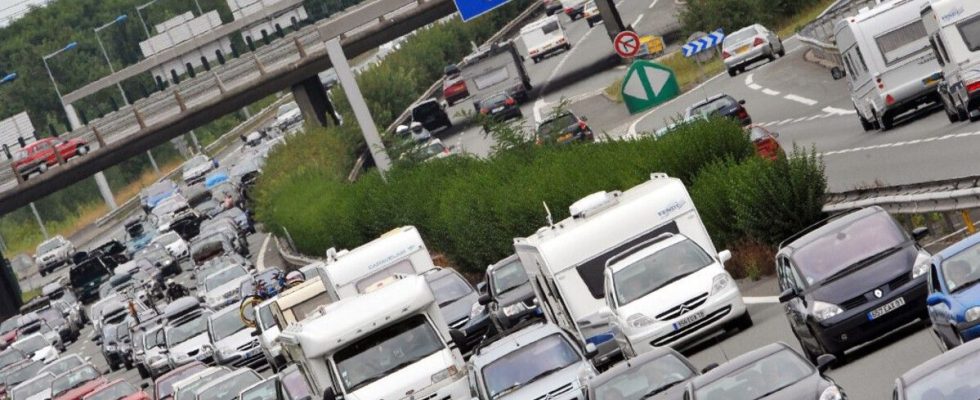What if the implementation of low emission zones (ZFE) did not take place in 2025 but rather in 2030? As in other metropolises, in Bordeaux, the debate around the timetables and the terms of the implementation of the ZFE is raging. It all started with a new Senate report, titled Mobility low-emission zones: breaking the deadlock in which Senators Jean-François Longeot and Philippe Tabarot call for a rethinking of the framework of the “Climate and Resilience” law. “Wherever they are set up, m-ZFEs come up against tensions and serious misunderstandings, both on the part of the local authorities responsible for setting them up and on the part of users, individuals and professionals, whose daily mobility will be affected by the traffic restrictions”, they write in this report published on June 14.
If we stick to the current calendar of the Bordeaux metropolis, vehicles categorized Crit’Air 4 and 5 [les voitures à moteurs diesel d’avant 2006 et à essence d’avant 1997] will no longer be able to circulate in the intra-ringroad conurbation from 2025. But as things stand, a year and a half before the deadline, are these deadlines tenable?
“We have to review things from floor to ceiling”
Not sure for Claudine Bichet, deputy mayor of Bordeaux in charge of the climate challenge, and vice-president of Bordeaux metropolis for climate, energy transition and health. “We have to review things from the ground up if we want to put in place an effective, accepted and achievable measure. Is it really possible to ask communities to finance the purchase of a car? It will cost us an astronomical sum, ”explains the elected 20 minutes. According to the estimates of the metropolis, this measure will cost 40 million euros to the community. “In order to set up the ZFE, we need massive financial support from the State”, slips Claudine Bichet.
As for the question of the acceptability of the ZFE by the population, for the moment, the ideological and educational battle is far from over: according to a survey conducted as part of the Senate report, 86% of individuals and 79% of professionals are opposed to the deployment of EPZs.
“The devil wears the face of the territorial divide”
So backing down, is that giving up the fight against air pollution? “No”, insists Claudine Bichet. According to her, if the debate is today centered on a postponement of the entry into force of the EPZs, it is also and above all due to a lack of interest of the State for these questions. “When Emmanuel Macron’s government decides that a subject is a priority, it has no problem putting it at the top of the pile. If the State really wants to act effectively on the subject of air pollution, I do not think that the calendar needs to be pushed back five years, ”annoys the elected official.
Pushing back the deadlines, Fabien Robert (Modem), municipal councilor and metropolitan of Bordeaux, is also in favor of it. “It’s a common sense law. Every year, we know that 600 people die in Gironde from air pollution. On the other hand, the devil is in the application of this law. A devil who can wear the face of the territorial divide, ”explains the member of the opposition.
“The law must be adapted according to two criteria. First, that of air pollution. Since the Covid-19 and our changes in habits, the latter has been declining. So, to meet WHO standards, do we need to follow such strict schedules? Next, economic acceptability must be taken into account. The main risk would be that financial aid does not reach the right people,” explains Fabien Robert.
Indeed, what to do with Girondins who do not belong to the Metropolis and who cannot benefit from conversion aid? Alain Anziani, the president of Bordeaux Métropole, was already worried about it in January in our columns. “The big question is: do we want to regenerate a phenomenon like the yellow vests? ” he said. For the opponent to the town hall, the regional council must also provide its share of aid, so that all the inhabitants of the Gironde can more easily change their cars.
Crit’Air thumbnails already has been?
But at the heart of the discussions around the ZFE, the calculation methods of the now famous Crit’Air vignettes are also debated. Like the rebellious deputies Sylvain Carrière and François Piquemal, elected respectively from Hérault and Haute-Garonne, Claudine Bichet is in favor of a rapid change of Crit’Air to include other variables in particular. “These stickers only take into account the atmospheric pollutants generated by the engines, and not the pollutants emitted by the braking, or the carbon footprint of the vehicles”, explains the elected official.
Fabien Robert also pleads for the implementation of “adaptation and exceptional measures”. “For a person with one of the most polluting vehicles who comes to Bordeaux six times a year, ecologically, having them change vehicles is insane”, illustrates the elected Modem, while remaining more reserved on the need to review the methods of allocating Crit’Air stickers. “I think that we must first put this law into force, then think about a revision of the Crit’Air”.
In any case, the subject is far from closed. On July 10, a national consultation committee on the implementation of EPZs will have to submit the conclusions of its work. Something to revive the debate.

